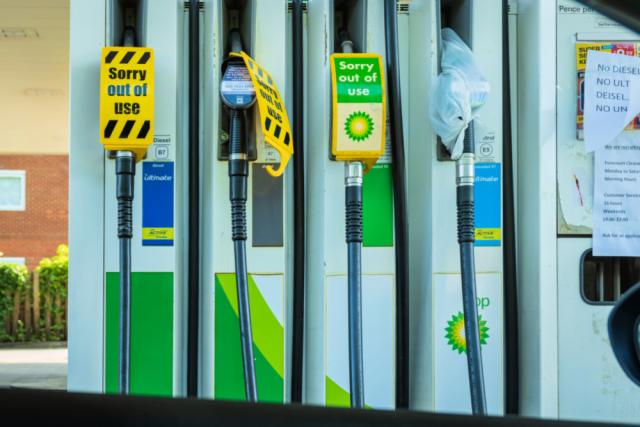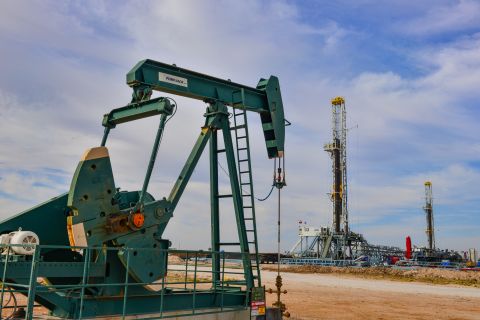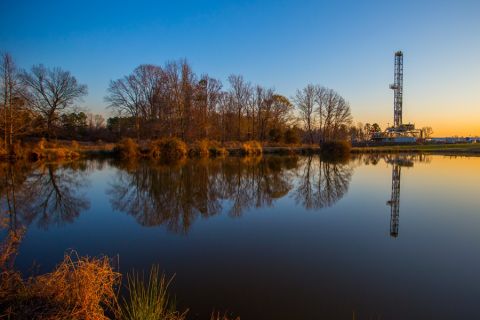
Out of use signs on fuel pumps at BP petrol station amid petrol and diesel fuel shortages in Britain on Sept. 26, 2021. (Source: Jevanto Productions / Shutterstock.com)
Editor’s note: The writer is editor-in-chief of MoneyWeek. Views are personal.
Earlier this week the online U.K. supermarket Ocado told its customers that it had “limited ability” to deliver ice cream to them. Why? Because the price of natural gas has soared. That has caused two of the U.K.’s big industrial fertilizer plants to shut down, as natural gas is the feedstock for ammonia, which is used to make fertilizer. Since CO₂ is captured from ammonia production, this has hit the supply of CO₂ in the U.K. And that has led to a cut in the supply of dry ice that supermarkets use to keep food cool in their delivery vans. So, no ice cream.
We can live without ice cream. But what of the other effects? Abattoirs are short of the gas they need to stun animals, hospitals might not have the CO₂ they need for minor surgeries, and the nuclear industry is low on the gas they need for cooling. These things really matter. This mini-crisis has been fairly quickly resolved, for now at least: the taxpayer is stepping in to subsidize a fertilizer factory for three weeks.
However, that doesn’t mean you shouldn’t worry. You should. This incident serves as a timely reminder of just how reliant we are on fossil fuels. Despite our optimistic enthusiasm for wind and solar power, one way or another oil and gas use is shot through every part of our economic and social lives. That will be the case for many decades to come.
In his recently updated book There is No Planet B, Mike Berners-Lee lays out the challenge (and, perhaps inadvertently, the lack of a medium-term solution). When we talk about shifting from fossil fuels to clean energy of one kind or another, we aren’t discussing taking the amount of energy we use now and producing that static amount in a different way. Instead, our target is always on the move. The more energy we can get our hands on, the more we use—even if our use of it becomes more efficient.
We use three times as much energy as we did 50 years ago and at current growth rates that will soon double again. Think of this in terms of solar panels. Right now, says Berners-Lee, if we could figure out storage and transmission (which so far we haven’t), we could meet all our global energy needs by covering 0.1% of the world’s land in solar panels. Keep expanding our energy use at 2.4% a year (the 10-year average is 1.5% but in 2018 it was 2.9%) and in 300 years we will need every inch of landmass there is in every country in the world.
In one sense this is a ridiculous way to look at it—we live in a stunning age of innovation and the panels we use today will surely look amusingly archaic in a decade or two. Abattoirs and others can find another solution instead of gas. But you get the point: energy usage is going to keep rising, led by China, the U.S. and India, while energy transitions tend to both take a very long time and never actually end. We just pile new sources on top of old. The world still uses much the same amount of traditional biomass (wood etc.) as it did 100 years ago. Even after many years of efforts, coal, oil and gas still make up 80% of our global energy mix, pretty much exactly the same number as a decade ago. We are running to stand still.
This will change. But not as fast as you might like to think. In 2019, 33% of our new power generation needs were met by renewable energy. That’s a start. But 40% were met by natural gas.
There’s urgency here of course—which might speed things up. But there is something else that might slow us down. It didn’t take much to move people to fossil fuels—they are relatively easy to extract, relatively easy to transport, hugely energy dense and efficient and, of course, cheap. Until their externalities were understood, who could possibly have objected? Our current transition is different: people and companies will switch not because the new sources are easier to access, cheaper or more energy dense but because regulation mandates that they must.
Either way, the truth is that whether we like it or not our energy transition involves long term reliance on fossil fuels. That means that we should stop demonizing them—evangelizing about ESG, following the trend to divest from shares in oil companies and kiboshing new projects with regulation, high financing costs (many banks are pulling back from the sector) and the like. Instead, we should focus on making their extraction cleaner and more efficient while we wait for the engineering challenges around a renewables-led future to be solved.
If we don’t do this—if we allow ourselves to be beguiled by the idea that solar is so advanced that we no longer need filthy fuels to have ice cream, we will find the future held back by needlessly expensive energy—and almost certainly ice-cream free. Some reckon that the global population will gladly slash their energy use and pay a “greenium” for the energy they do use. I’d say anyone who believes that has never been on the customer services desk at Ocado, or asked someone in India whether they would like the same average living standard as the average European or, for that matter, received their latest gas bill.
Recommended Reading
Benchmark Closes Anadarko Deal, Hunts for More M&A
2024-04-17 - Benchmark Energy II closed a $145 million acquisition of western Anadarko Basin assets—and the company is hunting for more low-decline, mature assets to acquire.
‘Monster’ Gas: Aethon’s 16,000-foot Dive in Haynesville West
2024-04-09 - Aethon Energy’s COO described challenges in the far western Haynesville stepout, while other operators opened their books on the latest in the legacy Haynesville at Hart Energy’s DUG GAS+ Conference and Expo in Shreveport, Louisiana.
Mighty Midland Still Beckons Dealmakers
2024-04-05 - The Midland Basin is the center of U.S. oil drilling activity. But only those with the biggest balance sheets can afford to buy in the basin's core, following a historic consolidation trend.
Mesa III Reloads in Haynesville with Mineral, Royalty Acquisition
2024-04-03 - After Mesa II sold its Haynesville Shale portfolio to Franco-Nevada for $125 million late last year, Mesa Royalties III is jumping back into Louisiana and East Texas, as well as the Permian Basin.




